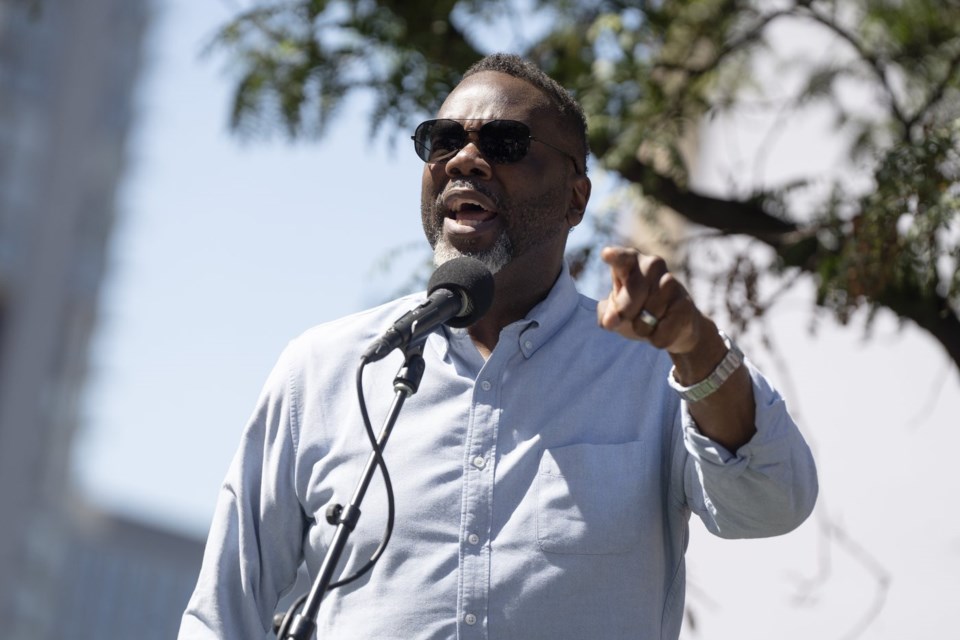CHICAGO (AP) — Eight people were killed and 50 others were wounded over the Labor Day weekend in dozens of shootings in Chicago, where President Donald Trump has seized on crime to try to justify a greater federal role on the city’s streets.
The toll highlights Chicago's persistent struggle with gun violence and reveals a grim reality: spikes in shootings during summer holiday weekends, particularly on the South and West sides. The violence this time was deadlier than last Labor Day, when seven people were killed and more than 20 were wounded.
The violence has taken on a sharper national resonance this year, colliding with the politics of crime and immigration as the Trump administration plans to ramp up immigration enforcement in the city in the coming weeks.
On Tuesday, Trump blasted the city and its leaders in a post on his social media platform, calling it “the worst and most dangerous city in the World, by far.”
Last year, the city had 573 homicides, or 21 per every 100,000 residents, according to the Rochester Institute of Technology. Other cities had a higher rate in 2024. Chicago’s rate was down 25% compared to 2020.
When asked about sending National Guard troops to Chicago, Trump said on Tuesday, “We're going in,” but added, “I didn't say when.”
“We have the right to do it,” he said.
Mayor Brandon Johnson and Illinois Gov. JB Pritzker, both Democrats, have repeatedly said there’s no reason for Trump to send the National Guard, which is on the ground in the District of Columbia, targeting crime, immigration and homelessness.
“We’ve got crime on the streets,” Pritzker acknowledged last week. “Any person that gets killed or hurt is a victim of crime, is somebody that we ought to be addressing the challenges for. And we’re doing that every day. But the way to do it is with police officers, not with troops.”
Between Friday night and Monday night, 58 people were shot in 37 separate shootings in the nation’s third-largest city, according to preliminary information from police. Most survivors were in good or fair condition, but several were listed in serious or critical condition, including a 17-year-old boy. In most cases, no suspect was in custody.
Chicago officials have long argued that the city’s gun violence is fueled less by local laws than by the steady influx of firearms from nearby states with looser regulations. Mayor Brandon Johnson said on Tuesday that too many guns are trafficked into Illinois from neighboring states — especially Indiana, which is led by Republicans — and end up on city streets.
“Chicago will continue to have a violence problem as long as red states continue to have a gun problem,” Johnson said.
For years, federal prosecutors and law enforcement agencies have tried to disrupt that pipeline, targeting so-called “straw purchasers” who buy firearms legally in states like Indiana and then resell them to criminal gangs in Chicago, where they are used in street crimes.
Separately, the Trump administration is expected to expand immigration operations in Chicago. Department of Homeland Security Secretary Kristi Noem confirmed plans for a greater presence of federal agents.
Johnson over the weekend signed an order, declaring that Chicago police will not collaborate with military personnel on police patrols or civil immigration enforcement.
Police will not be “deputized to do traffic stops and checkpoints for the president," said the mayor, adding that the Trump administration is “out of control.”
Violent crime has dropped in recent years in Chicago, population 2.7 million, but it remains a persistent problem in some neighborhoods. Some with the highest homicide rates have 68 times more homicides than those with the lowest rates, according to the University of Chicago Crime Lab.
Chicago police post weekly crime stats online. The department says there were 278 murders so far this year, through August, a 31% drop compared to the same eight-month period in 2024.
The Associated Press



